- Home
- Cecelia Ahern
Girl in the Mirror Page 3
Girl in the Mirror Read online
Page 3
‘I can’t find them.’
‘Are you in the bathroom?’
‘Of course.’
Ellie’s test was complete, the girl wanted Ellie dead, she knew that. Well she didn’t give up over fifty years ago, she wasn’t about to start now.
She quickly made her way downstairs.
‘Where are you going?’ Lila asked, appearing at the stairs.
Panicking but trying to hide it Ellie reached the front door. She opened it knowing the car was at the end of the garden outside the gate.
‘The driver’s here, we have to go.’
‘Oh,’ her voice relaxed. ‘Time to get married!’
‘You go ahead to the car, I just want to make a phone call,’ Ellie said easily.
‘Who are you calling?’ Lila was very quickly beside her. That cold air came with her.
‘Jeremy. I just want to tell him we’re leaving.’
‘I’ll come with you.’
She knew. She knew Ellie knew.
‘Jeremy,’ Ellie said, without excitement now, ‘we’re leaving the house now.’
‘Is everything okay?’ he asked, worried.
‘Why?’
‘You sound … you just sound down.’
Ellie left a silence. She wanted him to think there was something wrong. She wanted him to realise Lila wasn’t standing beside him in the church.
‘Grellie?’
‘Yes?’
‘Don’t worry, you’ll be okay. We’ll take care of you today. Okay?’
Ellie swallowed hard. ‘I’ll see you soon.’
They didn’t speak in the car. They didn’t speak when they got out of the car. Then, just as they arrived at the church and the doors were pulled open, the girl whispered in Ellie’s ear, ‘Imagine, poor Lila stuck in that black nothingness all on her own. And look at us here.’
The wedding march started up.
Ellie whispered back, ‘Yes, but she won’t be there for long, so why don’t you enjoy your moment and walk up the aisle alone.’
Ellie felt the girl’s surprise. She had probably thought Ellie would go along with it but she wouldn’t, she never would. Ellie stepped aside, had no idea where she was but felt the girl’s presence disappear and knew she had taken the steps and was walking up the aisle.
Ellie felt someone guide her to a seat where she sat, her stomach sick, while she listened to the sermon. Jeremy with such emotion in his voice, her, the girl, with icy coldness in hers.
After the ceremony, Jeremy came to Ellie.
‘Ellie, are you okay? Lila said you didn’t feel well, that you couldn’t walk her up the aisle.’
Ellie grabbed him by the arm, moved close to his ear, felt her nails dig in to his arm as she tried to hammer the message home. ‘Jeremy listen to me, I know you think I am crazy-‘
‘Of course I don’t think that,’ Jeremy interrupted.
‘Listen.’ She dug her nails in harder. ‘Fifty-two years ago, I looked in the mirror …’ and she told him the story. When she had finished, she heard silence. ‘Test her Jeremy. Just test her, that’s all I’ll say. Do it for me.’
‘Okay, okay, Ellie.’
He didn’t believe her, she knew that he didn’t and she’d known that he wouldn’t, but the seed had been planted and no matter how many years he would spend with this girl, at least he would always have Ellie’s explanation in his head. Maybe some day he would believe it.
It was as though Lila had been standing in the middle of a football stadium without realizing it, because all of a sudden pitch-blackness changed to bright light and she had to adjust her eyes. She was surrounded by people, lots of people she knew and loved. She smiled at them all but her face wouldn’t move. They had cameras in their hands, were smiling at her with fondness but they weren’t looking at her, they were looking at another Lila, the girl, her reflection who was standing in the middle of the dance floor in Jeremy’s arms.
Around her in the darkened space to which she was confined, everything she had spent the past few months organising was reflected back. The white roses on the tables were beautiful, the chairs were decorated with black bows. A black-and-white theme, all to disguise the black fabric that she had had specially made to cover the mirrors. But for some reason they were down on the floor.
And the girl was standing in the centre of the black-and-white dance floor, in Lila’s dress, with her arms wrapped around Lila’s boyfriend - husband now. And he was looking slightly bewildered. And Ellie … poor Ellie was standing among the crowd looking lost.
‘What are you doing, Lila?’ Jeremy asked through gritted teeth.
‘Let’s not fight now, everybody’s staring.’ The girl smiled back.
‘Just tell me, why have you taken the drapes down?’
‘What’s the point in booking the ballroom if we cover up all these beautiful mirrors. I want to see myself.’
‘It’s for Ellie, not for you, you know that.’
‘For who?’
Jeremy stiffened.
Then she laughed. ‘Oh, of course, I know who you mean. How could I forget Grellie.’ She laughed. ‘Grellie, Grellie, Grellie, Ellie. Look, she’ll get over it. She’s acting so oddly today. I think we should take her to the doctor. She’s rambling on about some bizarre things. She might have mentioned something to you.’
‘About what?’
‘About a mirror? Anything like that?’
Jeremy studied her. Felt her coldness. Knew something wasn’t right. ‘I love you, monkey.’
The girl laughed, was confused for a moment, then remembered earlier that morning when Lila had looked in the car mirror and said, ‘I love you too, hippo.’
Jeremy smiled. Looked relieved.
‘Now, let’s dance.’
In the mirror, Lila suddenly felt her arms lift as they wrapped themselves around Jeremy’s neck, though she couldn’t feel him. Then she started to spin. Fast, then faster, round and round, till she felt sick. All around her, faces smiled and she wanted to call out for help, for them to get her out of here, but they weren’t looking at her. Not in the mirror. They were looking at the girl in the centre of the floor.
Once home, Ellie stood in front of the mirror.
‘I’m sorry, my love. I’m so sorry. I would swap places with you but it wouldn’t work. I can’t take your eyes. You would be my reflection and you would look like me. I’ve thought it all through. It won’t work. I’ve called Jeremy over and over, but he’s not answering. They went away, on the honeymoon … Oh my love, I’m so sorry.’
Ellie made plans to make the room prettier. She removed the black drape from the mirror. She added flowers to the room, opened the curtains, cleaned the room, lit the fireplace in an effort to warm up Lila’s cold space, knowing that it wouldn’t work but trying everything regardless. Months went by, Ellie wouldn’t see anybody, she wouldn’t take any visitors, refused to talk to Jeremy. She was afraid they’d take her away, and send her back to that place they locked her away in that very first time … So she stayed alone.
Then one day she had an idea. She wanted to paint the room, so she hired a local painter, took her time researching the local tradesmen. She found the right one.
A young man. Twenty-five years old. Polish, no family in the country.
‘Here’s your tea.’ Ellie placed his mug down on the bedside locker.
‘Thank you.’
‘You’re very welcome. Would you like any more sandwiches? Cakes?’
‘No, thank you, I am full from all of the lovely food.’ He smiled and patted his belly.
‘Good. Do you mind if I ask a favour?’ Ellie said politely.
He stopped painting and put down his brush.
‘Would you please help me to clean this mirror? You seemed to have splashed it with some paint.’
He leaned in close to the mirror, placed a finger to the glass and tried to scrape it with his nail.’
‘Now my love, this is your chance,’ Ellie said.
Lila fo
und herself faced with a young man. No more than twenty-five.
‘What is this?’ he asked, looking around, completely bewildered.
Lila’s eyes were wide.
‘I’m going to ask you a question,’ she said coldly, ‘and you have three chances to say yes …’ She began.
The secret drifted on the breeze like a feather - from the house, over the dandelions, thistles and fuschia, out of the rusting gate, down the coastline and into the village - about Ellie and her new housemate. At first it was thought he was a lodger, a young man helping the old blind woman around the house now that her granddaughter had flown the nest and curiously never returned. A mysterious feud the villagers enjoyed playing guessing games about without so much as coming close to a whisper of the truth. They couldn’t understand the connection between the twenty-five-year-old Polish man and the seventy-year-old woman, but it appeared he brought her to life, and she him, for there they lived until the old woman’s passing, happily together in the big house on the cliff.
The Memory Maker
It is a beautiful day and she says so. He whistles as he walks alongside her and she hums along happily - a song played on the piano in the bar last night, which stays in their minds, trapped, the melody fluttering around continuously like a butterfly in a jam jar. Her hand in his, his so large his fingers wrap around her entire hand, giving her the appearance of a small child. She is not though, she is the most beautiful woman he has ever seen, has ever touched, has ever smelled. And he tells her so. She smiles, she has heard it a dozen times that morning but it does not annoy her; with each new compliment she glows even more so. He looks at her, with the sun streaming down on her blonde hair and she is lit up, a perfect angel. They walk through Merrion Square hand in hand, listening to the children’s screams of delight, which float on the breeze, swept up from a nearby playground.
A stick lands before their feet. She lets out a little high-pitched yelp of fright, then she laughs at herself. He teases her. A little embarrassed, she momentarily rests her head on his shoulder. He smells her shampoo. Water lily. Silly me, she says. He compliments her again. She is the least silly woman he has ever seen, ever touched, ever smelled. She takes the compliment again. A dog races by them on the path, a blonde Labrador, large and clumsy as though his feet don’t belong to him at all, like he’s wearing an oversized pair of shoes. She says so and he laughs. The dog dives on the stick, takes it in his hungry mouth and races back in the direction he came. They turn around and watch him scarper to his master. Eager to please. Sorry, the man waves at them. No problem, she replies. It’s a beautiful day, she says to him, and he agrees. They all agree. They continue on. It’s deep in July, the trees are crammed with leaves and flowers and the air is filled with their scent. It tickles his nose, ignites his hay fever. She hands him a handkerchief though he has not yet sneezed. She knows him so well.
He takes her handkerchief, fresh white, her initials sewn into the corner in pink. JJ. A gift from her mother. He blows his nose and playfully hands it back to her. She laughs again. The lines appearing around her mouth like the ripples in a pond after throwing a pebble. Light, fluid, natural, beautiful.
He is neither a doctor nor a scientist. Some consider him a psychologist, but he is not that either. He is merely a man who has loved, and for that he has acquired a wealth of experience, not just for what he does now and is known around the world for, but for his life.
Tucked away in the basement of a Georgian house in Fitzwilliam Square, the futuristic device finds its home in a historic setting. Dark rooms, despite large windows, and cold, damp furniture, despite constant heating. His clients are often surprised when they take in the surroundings. They didn’t know what they were expecting, but it wasn’t this. He is revered by some but angers most, for they fear that he has contaminated what is most natural in the world - the mind, the memory. And what has caused such debate around the world; what causes some people to adore him and some to curse him?
A device, a machine really. The memory-maker they call it. He doesn’t. It’s the mind that makes the memory - in his opinion it’s more so the heart but he won’t get into that now - and once the mind has made the memory, the machine stamps it into the memory files as though they are as real and true and as honest and unforgettable as all the others. The new memories are memories that people wish they had, or memories people have forgotten and need to refresh, though they never succeed in becoming the original thing no matter how hard they try to recreate them. The mind reinvents all by itself. It does it to survive. And the machine has helped the creator of the machine to survive. No, it hasn’t helped him. It has kept him alive. Gave him reason. A thing he felt his life was deeply lacking in.
He came across the invention by accident. Contrary to popular opinion, he did not spend years working on the contraption, as a means of leaving behind the reality of what happened to him. The great sadness, which he has never discussed with anybody. And he doesn’t believe that fate brought him to where he is now either. Nor does he believe in fate. Accidents happen. That’s just what they are. Accidents. And so when he was playing around at home with his machines and wires and found a way to tell the machine to tell the brain to create a memory, it was an accident. Simple as that. But it was a convenient accident. Most aren’t.
He has now perfected the machine and clients come from near and far to see him; frazzled, hopeless souls searching for peace of mind.
He knows when it’s a journalist sitting before him. He can see it in their eyes. A desire, just like regular clients, but the wrong kind. They are hungry. Though there are those with the intention to write positively about it and about him, he knows that most of them are intent on destroying what he has built up. Those people don’t understand it. Some fear it, but most are too cynical to open their minds to its beauty. He doesn’t care. He can spot them as soon as they step through the door, looking around with their questioning gaze - eyes searching him and his home and his machine like fire-drill interrogation. Their visits are never to self-improve, though each of them could do with the session for why would they hold such loathing for things that have nothing to do with them.
He is known for being particular about his visitors, for cancelling appointments at short notice, sometimes at the mere sight of them, closing the door on faces of anxious arrivees. He can sense the dishonesty, those who are merely there out of curiosity, those who wish to interrogate, replicate and obliterate. He doesn’t want to share it. He doesn’t want it to be misused.
He welcomes people from far and wide - the grieving, the sick, the lost, the occasional misplaced souls.
He realised some years ago that he had garnered quite a reputation. Word had spread about the device, rumours had spread about its creator, write-ups had appeared in the papers; personal accounts of customers, speculative pieces by those who hadn’t set a foot near it or him or his building. He had shut up shop when he learned his machine was in fashion, angry that his work had been reduced to a fad. His desire was for the device to be for people who needed it, because to want it was merely not enough. It appeared that when he took it away, he gained more followers. He had a waiting list as long as Griffith Avenue, and dozens upon dozens of letters arrived each day, more than he could deal with. He reluctantly ended his solitary life and hired an assistant. A girl who called herself Judith, though he doubted that name was as much hers as the clothes on her back. Judith. It was a coincidence, he knew that. He didn’t believe there was much more to it than that … she couldn’t have known … and yet …
He had met her on Parliament Street, with City Hall and its three fronts of Portland stone behind him, the Liffey and the Four Courts ahead of him, as he strolled with cane in hand to yet another court date, as the forces - those who did not understand - attempted to stop his practice. He was representing himself then, knew what he was doing, left-over knowledge from his previous occupation. He’d passed her on the street. Judith that is. A brown little thing sitting on the pavement, a b
rown blanket wrapped tightly around her, her hair dark brown and slicked down with grease, her face heavily freckled as if each passing shoe had flicked her with dirt. She didn’t even have an umbrella, the wet cold ground was slippy beneath feet and yet there she sat, on the only dry ground it seemed in the whole of Dublin.
He stopped beside her.
She looked up.
‘Sir.’
‘Would you like my umbrella?’
‘You’ll get wet.’
‘But you’re getting wet.’
‘It’s not my umbrella.’
‘I’ll give it to you.’
‘You’ll get wet.’
‘I’ll buy another one.’
He walked into the shop and purchased a new umbrella. A dull brown-and-olive plaid synthetic thing with a wooden handle, which looked as though a gust of wind would blow it inside out.
‘Here.’
He handed her his umbrella. It was black, large, silk, with a sterling-silver handle. An eagle. It had been a gift. From the person he doesn’t talk about. Can barely even think about. He didn’t think twice about giving it away. He thought twice about not thinking twice. This intrigued him, made him wonder if he was healed after all this time. Then he thought of her face and her smell and her touch and his heart twisted and he knew the wound was as open and sore as it always was. She was not the umbrella; he was not giving her away.
‘This is your umbrella.’
‘Technically, they’re both mine.’
‘Why don’t you give me the new one?’
‘Why would I do that?’
‘This is too good.’
‘But I offered you this one.’
‘But I don’t mind the plaid one.’
‘That’s very kind of you but I’m a man of my word.’
She ran her hand over the handle. It was huge in her small hand.

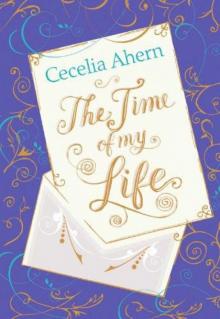 The Time of My Life
The Time of My Life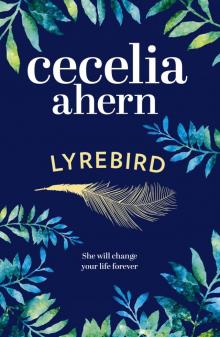 Lyrebird
Lyrebird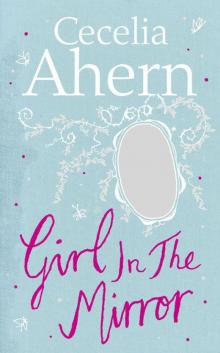 Girl in the Mirror
Girl in the Mirror Perfect
Perfect One Hundred Names
One Hundred Names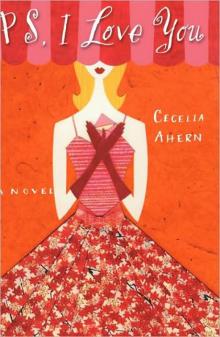 PS, I Love You
PS, I Love You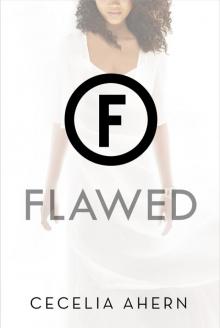 Flawed
Flawed The Book of Tomorrow
The Book of Tomorrow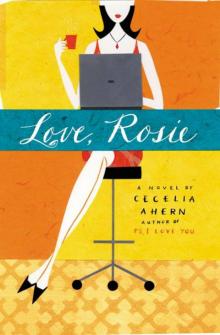 Love, Rosie
Love, Rosie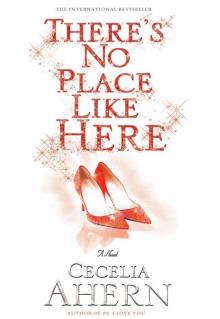 A Place Called Here
A Place Called Here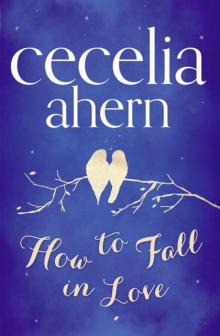 How to Fall in Love
How to Fall in Love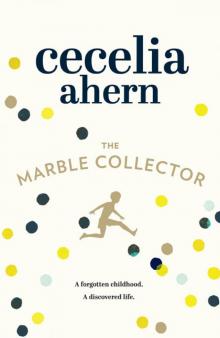 The Marble Collector
The Marble Collector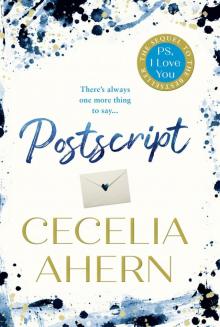 Postscript
Postscript The Gift
The Gift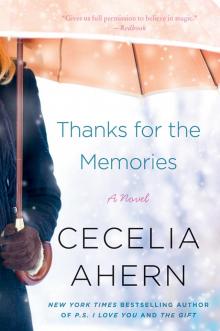 Thanks for the Memories
Thanks for the Memories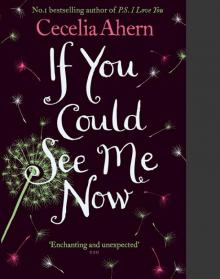 If You Could See Me Now
If You Could See Me Now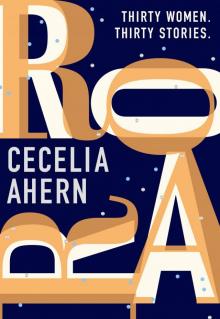 Roar
Roar Cecelia Ahern 2-book Bundle
Cecelia Ahern 2-book Bundle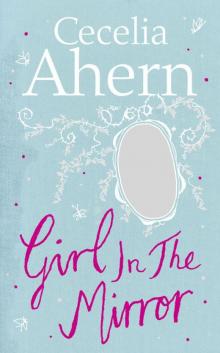 Girl in the Mirror: Two Stories
Girl in the Mirror: Two Stories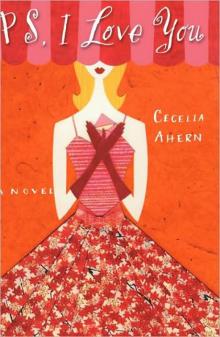 PS, I Love You: A Novel
PS, I Love You: A Novel Cecelia Ahern Short Stories
Cecelia Ahern Short Stories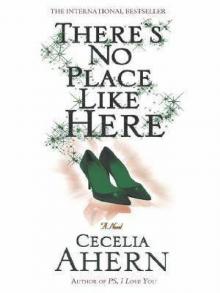 There’s No Place Like Here
There’s No Place Like Here